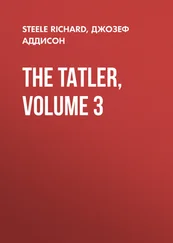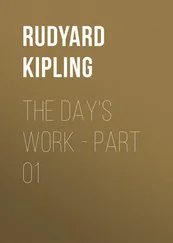Джозеф Киплинг - The Day's Work - Volume 1
Здесь есть возможность читать онлайн «Джозеф Киплинг - The Day's Work - Volume 1» весь текст электронной книги совершенно бесплатно (целиком полную версию без сокращений). В некоторых случаях можно слушать аудио, скачать через торрент в формате fb2 и присутствует краткое содержание. Год выпуска: 2014, Издательство: epubBooks Classics, Жанр: Прочие приключения, на английском языке. Описание произведения, (предисловие) а так же отзывы посетителей доступны на портале библиотеки ЛибКат.
- Название:The Day's Work - Volume 1
- Автор:
- Издательство:epubBooks Classics
- Жанр:
- Год:2014
- ISBN:нет данных
- Рейтинг книги:3 / 5. Голосов: 1
-
Избранное:Добавить в избранное
- Отзывы:
-
Ваша оценка:
- 60
- 1
- 2
- 3
- 4
- 5
The Day's Work - Volume 1: краткое содержание, описание и аннотация
Предлагаем к чтению аннотацию, описание, краткое содержание или предисловие (зависит от того, что написал сам автор книги «The Day's Work - Volume 1»). Если вы не нашли необходимую информацию о книге — напишите в комментариях, мы постараемся отыскать её.
The Day's Work - Volume 1 — читать онлайн бесплатно полную книгу (весь текст) целиком
Ниже представлен текст книги, разбитый по страницам. Система сохранения места последней прочитанной страницы, позволяет с удобством читать онлайн бесплатно книгу «The Day's Work - Volume 1», без необходимости каждый раз заново искать на чём Вы остановились. Поставьте закладку, и сможете в любой момент перейти на страницу, на которой закончили чтение.
Интервал:
Закладка:
What devil of delay possessed him to slip on his spring overcoat, I cannot tell. They say a slight noise rouses a sleeper more surely than a heavy one, and scarcely had the doctor settled himself in his sleeves than the giant waked and seized that silk–faced collar in a hot right hand. There was rage in his face–rage and the realisation of new emotions.
"I'm—I'm not so comfortable as I were," he said from the deeps of his interior. "You'll wait along o' me, you will." He breathed heavily through shut lips.
Now, if there was one thing more than another upon which the doctor had dwelt in his conversation with me, it was upon the essential law–abidingness, not to say gentleness, of his much–misrepresented country. And yet (truly, it may have been no more than a button that irked him) I saw his hand travel backwards to his right hip, clutch at something, and come away empty.
"He won't kill you," I said. "He'll probably sue you in court, if I know my own people. Better give him some money from time to time."
"If he keeps quiet till the stuff gets in its work," the doctor answered, "I'm all right. If he doesn't…my name is Emory—Julian B. Emory—193 'Steenth Street, corner of Madison and—"
"I feel worse than I've ever felt," said the navvy, with suddenness. "What–did–you–give–me–the–drink–for?"
The matter seemed to be so purely personal that I withdrew to a strategic position on the overhead bridge, and, abiding in the exact centre, looked on from afar.
I could see the white road that ran across the shoulder of Salisbury Plain, unshaded for mile after mile, and a dot in the middle distance, the back of the one porter returning to Framlynghame Admiral, if such a place existed, till seven forty–five. The bell of a church invisible clanked softly. There was a rustle in the horse–chestnuts to the left of the line, and the sound of sheep cropping close.
The peace of Nirvana lay upon the land, and, brooding in it, my elbow on the warm iron girder of the footbridge (it is a forty–shilling fine to cross by any other means), I perceived, as never before, how the consequences of our acts run eternal through time and through space. If we impinge never so slightly upon the life of a fellow–mortal, the touch of our personality, like the ripple of a stone cast into a pond, widens and widens in unending circles across the aeons, till the far–off Gods themselves cannot say where action ceases. Also, it was I who had silently set before the doctor the tumbler of the first–class lavatory compartment now speeding Plymouthward. Yet I was, in spirit at least, a million leagues removed from that unhappy man of another nationality, who had chosen to thrust an inexpert finger into the workings of an alien life. The machinery was dragging him up and down the sunlit platform. The two men seemed to be learning polka–mazurkas together, and the burden of their song, borne by one deep voice, was: "What did you give me the drink for?"
I saw the flash of silver in the doctor's hand. The navvy took it and pocketed it with his left; but never for an instant did his strong right leave the doctor's coat–collar, and as the crisis approached, louder and louder rose his bull–like roar: "What did you give me the drink for?"
They drifted under the great twelve–inch pinned timbers of the foot–bridge towards the bench, and, I gathered, the time was very near at hand. The stuff was getting in its work. Blue, white, and blue again, rolled over the navvy's face in waves, till all settled to one rich clay–bank yellow and—that fell which fell.
I thought of the blowing up of Hell Gate; of the geysers in the Yellowstone Park; of Jonah and his whale: but the lively original, as I watched it foreshortened from above, exceeded all these things. He staggered to the bench, the heavy wooden seat cramped with iron cramps into the enduring stone, and clung there with his left hand. It quivered and shook, as a breakwater–pile quivers to the rush of landward–racing seas; nor was there lacking when he caught his breath, the "scream of a maddened beach dragged down by the tide." His right hand was upon the doctor's collar, so that the two shook to one paroxysm, pendulums vibrating together, while I, apart, shook with them.
It was colossal–immense; but of certain manifestations the English language stops short. French only, the caryatid French of Victor Hugo, would have described it; so I mourned while I laughed, hastily shuffling and discarding inadequate adjectives. The vehemence of the shock spent itself, and the sufferer half fell, half knelt, across the bench. He was calling now upon God and his wife, huskily, as the wounded bull calls upon the unscathed herd to stay. Curiously enough, he used no bad language: that had gone from him with the rest. The doctor exhibited gold. It was taken and retained. So, too, was the grip on the coat–collar.
"If I could stand," boomed the giant, despairingly, "I'd smash you—you an' your drinks. I'm dyin'—dyin'—dyin'!"
"That's what you think," said the doctor. "You'll find it will do you a lot of good"; and, making a virtue of a somewhat imperative necessity, he added: "I'll stay by you. If you'd let go of me a minute I'd give you something that would settle you."
"You've settled me now, you damned anarchist. Takin' the bread out of the mouth of an English workin'man! But I'll keep 'old of you till I'm well or dead. I never did you no 'arm. S'pose I were a little full. They pumped me out once at Guy's with a stummick–pump. I could see that, but I can't see this 'ere, an' it's killin' of me by slow degrees."
"You'll be all right in half–an–hour. What do you suppose I'd want to kill you for?" said the doctor, who came of a logical breed.
"'Ow do I know? Tell 'em in court. You'll get seven years for this, you body–snatcher. That's what you are—a bloomin' bodysnatcher. There's justice, I tell you, in England; and my Union'll prosecute, too. We don't stand no tricks with people's insides 'ere. They give a woman ten years for a sight less than this. An' you'll 'ave to pay 'undreds an' 'undreds o' pounds, besides a pension to the missus. You'll see, you physickin' furriner. Where's your licence to do such? You'll catch it, I tell you!"
Then I observed what I have frequently observed before, that a man who is but reasonably afraid of an altercation with an alien has a most poignant dread of the operations of foreign law. The doctor's voice was flute–like in its exquisite politeness, as he answered:
"But I've given you a very great deal of money—fif–three pounds, I think."
"An' what's three pound for poisonin' the likes o' me? They told me at Guy's I'd fetch twenty–cold–on the slates. Ouh! It's comin' again."
A second time he was cut down by the foot, as it were, and the straining bench rocked to and fro as I averted my eyes.
It was the very point of perfection in the heart of an English May–day. The unseen tides of the air had turned, and all nature was setting its face with the shadows of the horse–chestnuts towards the peace of the coming night. But there were hours yet, I knew—long, long hours of the eternal English twilight—to the ending of the day. I was well content to be alive—to abandon myself to the drift of Time and Fate; to absorb great peace through my skin, and to love my country with the devotion that three thousand miles of intervening sea bring to fullest flower. And what a garden of Eden it was, this fatted, clipped, and washen land! A man could camp in any open field with more sense of home and security than the stateliest buildings of foreign cities could afford. And the joy was that it was all mine alienably—groomed hedgerow, spotless road, decent greystone cottage, serried spinney, tasselled copse, apple–bellied hawthorn, and well–grown tree. A light puff of wind—it scattered flakes of may over the gleaming rails—gave me a faint whiff as it might have been of fresh cocoanut, and I knew that the golden gorse was in bloom somewhere out of sight. Linneeus had thanked God on his bended knees when he first saw a field of it; and, by the way, the navvy was on his knees, too. But he was by no means praying. He was purely disgustful.
Читать дальшеИнтервал:
Закладка:
Похожие книги на «The Day's Work - Volume 1»
Представляем Вашему вниманию похожие книги на «The Day's Work - Volume 1» списком для выбора. Мы отобрали схожую по названию и смыслу литературу в надежде предоставить читателям больше вариантов отыскать новые, интересные, ещё непрочитанные произведения.
Обсуждение, отзывы о книге «The Day's Work - Volume 1» и просто собственные мнения читателей. Оставьте ваши комментарии, напишите, что Вы думаете о произведении, его смысле или главных героях. Укажите что конкретно понравилось, а что нет, и почему Вы так считаете.












